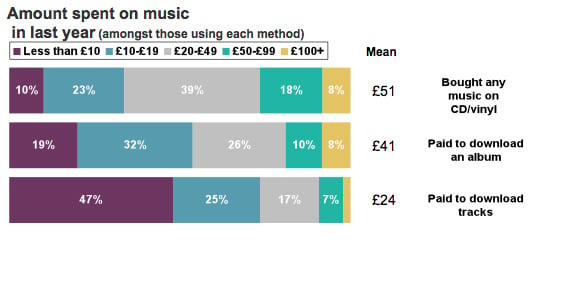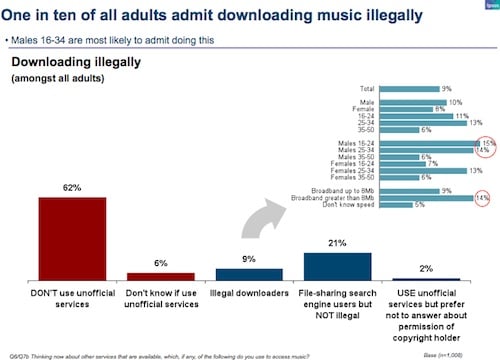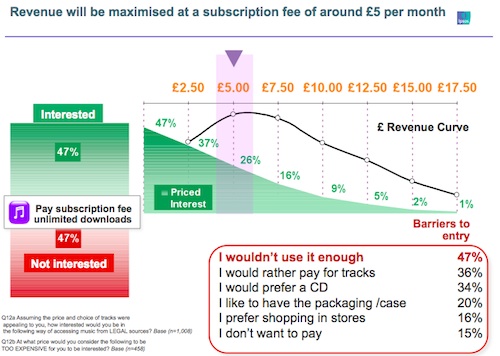Original URL: https://www.theregister.com/2009/11/01/demos_music_survey/
Ignoring P2Pers costs music biz dear - survey
Most don't leech, think tank discovers
Posted in Legal, 1st November 2009 16:11 GMT
A think tank survey into UK music fans suggests that timid major record companies, obsessed with "cannibalisation" and "substitution", have spent a decade barking up the wrong tree.
The Demos report, sponsored by Virgin Media, suggests file sharers aren't the wreckers of civilization they're painted to be - but failing to convert them into paying punters has cost the industry dear.
Two important strands emerge. Most of the population (74 per cent) pay for their music, and a majority - almost two thirds - never download unlicensed music. But those who do download are also spending on entertainment services, such as Skyplus. So by failing to be competitive with rival rival entertainment sectors, the music business is losing its wallet share. (See Fify Quid Bloke - meet Spotify's 14p man). The inward looking obsession where one format "substitutes" or "cannibalises" another has been the wrong conversation.
Overall, the survey finds something for everyone to draw comfort from - whether it's lower prices for songs or disconnection for downloaders.
Unsurprisingly the research finds a strong propensity to use unlicensed services amongst music fans - people who spend the most on music. And the opposite too: people who aren't interesting in acquiring music legitimately, as you'd expect, don't bother looking for it on the interwebs.
That's no surprise, but an uncomfortable statistic for the music business is that two-thirds of people polled never touch an unlicensed service at all - their hands (and mice) are clean. This makes it harder to argue that P2P Pirates have brought the industry to its knees, rather than other factors such as unbundling or failing to innovate.

High spending music fans also go hunting for unlicensed music - shock!
It's equally an uncomfortable figure for anti-copyright campaigners who argue that file sharing is now the norm. The "Everybody does it" argument is hard to sustain, when two thirds of people don't. But money talk may win the day. Since P2P-ers are already spending on replay TV services (72 per cent) and Skyplayer (24 per cent) - it suggests that failing to turn this group into paying punters is a costly error.
Confirming the polarized nature of the rhetoric, almost as many people think downloaders should be disconnected from their ISPs as believe that copyright should be reformed.
There's little appetite for a music tax on ISPs to compensate rights holders - only 3 per cent of non-infringers support the idea, and only 5 per cent of all adults polled.
The report confirms growing awareness of Rapidshare, and the high prominence of Google could either indicate brand familiarity, or the popularity of casual "grab an mp3" music consumption.
Demos researcher Peter Bradshaw raised a fascinating what-if? question.
"It would be interesting to see what kind of effect there would have been if people had been fined £30 for file sharing, rather than the seemingly disproportionate punishments pursued by the music business."
A couple of interesting price points emerge from the research. The revenue-maximising price for individual downloads should be 45p, but only a fiver a month for an unlimited download service. This is considerably lower than earlier research where people offered unprompted responses for how much they would pay for legal P2P. The figure has never been revealed, but is believed to be considerably higher than a fiver. And that's voluntary.
It's like asking "How hard would you kick the beggar? a) quite hard b) not very hard c) a little".
It once again suggests that the music business is leaving money on the table by refusing to license P2P services. And that money is picked up by rival entertainment industries. ®

